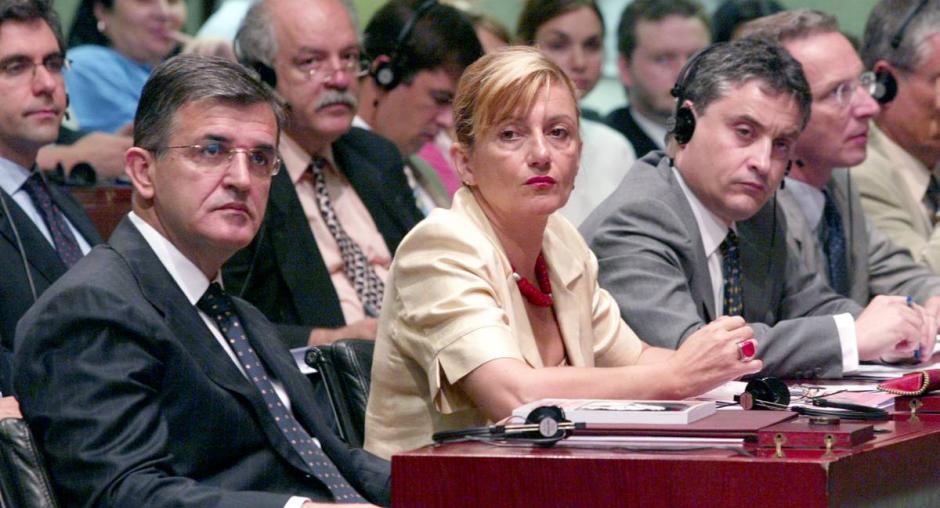Newsroom
OSCE Mission welcomes signing of agreement on inter-ethnic tolerance and co-operation in Belgrade
BELGRADE 6 July 2004

Ambassador Maurizio Massari, Head of the OSCE Mission to Serbia and Montenegro. (OSCE) Photo details
BELGRADE, 6 July 2004 - The OSCE Mission to Serbia and Montenegro welcomed today's signing in Belgrade of an agreement on inter-ethnic tolerance and co-operation by more than 40 cities and non-governmental organizations from south-eastern Europe.
By signing of the Protocol on Inter-Ethnic Tolerance and Co-operation, the signatories commit themselves to promote cultural diversity and to protect human and minority rights and other democratic principles.
"This initiative confirms that the 'dark page' of the region's recent past has been turned for good," said Ambassador Maurizio Massari, OSCE Mission Head, at the signing ceremony.
"It shows that through regional co-operation the peoples of this region can overcome the legacy of the past. A special tribute for this achievement goes to the region's civil society activists, such as the Centre for Regionalism from Novi Sad."
"Ethnic diversity and multi-culturalism are not a burden, but a factor of mutual enrichment, of progress and development of our societies. For this reason, they should not only be tolerated but also actively encouraged to bring the whole region closer to Europe," he added.
In his speech, Ambassador Massari also condemned episodes of inter-ethnic violence in Vojvodina.
"These acts contradict the spirit of trust and tolerance that is taking hold in Serbia and Montenegro and in the region, and which represents a main condition for the region to become a full part of the European family," he said.
The Protocol was signed by the cities' mayors and representatives of the participating NGOs. Major signatories include the mayors of Tuzla in Bosnia and Herzegovina (BiH) and Osijek in Croatia, as well as the Presidents of the cities of Belgrade and BiH's capital, Sarajevo.
The signing ceremony took place at a conference sponsored by the OSCE Mission and organized by the Ministry for Human and Minority Rights of the State Union of Serbia and Montenegro, the Centre for Regionalism from Novi Sad, and the Konrad Adenauer Foundation of Germany.
By signing of the Protocol on Inter-Ethnic Tolerance and Co-operation, the signatories commit themselves to promote cultural diversity and to protect human and minority rights and other democratic principles.
"This initiative confirms that the 'dark page' of the region's recent past has been turned for good," said Ambassador Maurizio Massari, OSCE Mission Head, at the signing ceremony.
"It shows that through regional co-operation the peoples of this region can overcome the legacy of the past. A special tribute for this achievement goes to the region's civil society activists, such as the Centre for Regionalism from Novi Sad."
"Ethnic diversity and multi-culturalism are not a burden, but a factor of mutual enrichment, of progress and development of our societies. For this reason, they should not only be tolerated but also actively encouraged to bring the whole region closer to Europe," he added.
In his speech, Ambassador Massari also condemned episodes of inter-ethnic violence in Vojvodina.
"These acts contradict the spirit of trust and tolerance that is taking hold in Serbia and Montenegro and in the region, and which represents a main condition for the region to become a full part of the European family," he said.
The Protocol was signed by the cities' mayors and representatives of the participating NGOs. Major signatories include the mayors of Tuzla in Bosnia and Herzegovina (BiH) and Osijek in Croatia, as well as the Presidents of the cities of Belgrade and BiH's capital, Sarajevo.
The signing ceremony took place at a conference sponsored by the OSCE Mission and organized by the Ministry for Human and Minority Rights of the State Union of Serbia and Montenegro, the Centre for Regionalism from Novi Sad, and the Konrad Adenauer Foundation of Germany.
